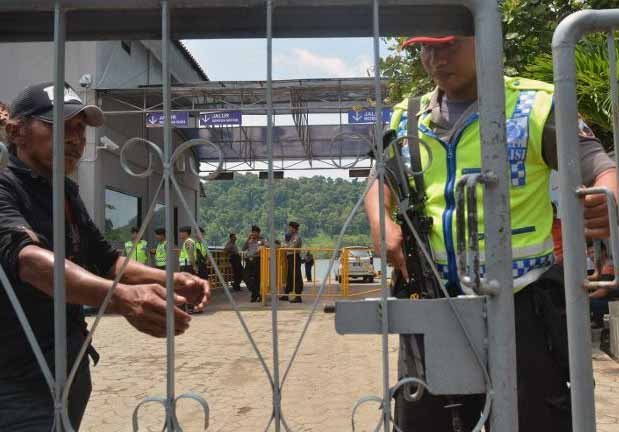
Mar 12, 2015 | News
Pakistan’s decision to fully reinstate the death penalty puts at imminent risk of execution more than 500 people on death row who have exhausted all avenues of appeal, with another 8000 facing death penalties, said the ICJ today.
“The total abandonment of the moratorium on the death penalty is a disaster for human rights in Pakistan,” said Sam Zarifi, ICJ’s Asia director. “We fear a major acceleration in the flow of executions we have seen over the past few months—none of which do anything to protect the rights of the Pakistani people.”
25 people have been executed since 16 December 2014, when Pakistan lifted a moratorium on executions in cases of capital punishment related to terrorism. The decision to partially lift a six-year unofficial moratorium on executions was in response to an attack on a school in Peshawar, killing 150 people, almost all of them children. Pakistan Tehreek-e-Taliban claimed responsibility for the attack.
In January, Pakistan also amended the Constitution and the Army Act, 1952, empowering military courts to try civilians for terrorism related offences.
“The Pakistani people face a very real threat from terrorist attacks, but there is no indication that the death penalty will decrease this threat,” said Zarifi. “Instead, the government is targeting hundreds of people on death row whose convictions had nothing to do with terrorism-related offenses.”
In Pakistan, capital punishment is prescribed for 27 different offences, including blasphemy, sexual intercourse outside of marriage, kidnapping or abduction, rape, assault on the modesty of women and the stripping of women’s clothes, smuggling of drugs, arms trading and sabotage of the railway system. Many of these crimes do not meet the threshold of ‘most serious crimes’ stipulated by Article 6 of the International Covenant on Civil and Political Rights (ICCPR).
Pakistan ratified the ICCPR in 2010. Article 6 of the ICCPR, guaranteeing the right to life, requires that states restrict capital punishment to only the ‘most serious crimes’. The UN Special Rapporteur on extrajudicial, summary or arbitrary executions has clarified that in the context of the death penalty, the definition of the ‘most serious crimes’ is limited to those cases in which there was an intention to kill, which resulted in the loss of life.
In December 2014, the UN General Assembly adopted a resolution, that emphasizes that that the use of the death penalty undermines human dignity and that calls on countries that maintain the death penalty to establish a moratorium on its use with a view to its abolition. An overwhelming majority of 117 UN Member States voted in favor of the call for a worldwide moratorium on executions, as a step towards abolition of the death penalty.
Pakistan should reinstate a moratorium on the death penalty, with a view to definitively abolishing the practice in law,” said Zarifi.
ICJ opposes capital punishment in all cases without exception. The death penalty constitutes a violation of the right to life and the right not to be subjected to cruel, inhuman or degrading punishment.
Contact
Sam Zarifi, ICJ Asia Pacific Regional Director (Bangkok), t: +66 807819002; email: sam.zarifi(a)icj.org
Reema Omer, ICJ International Legal Advisor for Pakistan (London), t: +447889565691; email: reema.omer(a)icj.org

Mar 4, 2015 | News
The ICJ today calls for the immediate suspension of the execution of 10 individuals in Indonesia who have been convicted of drug-related offences and are scheduled to be executed by firing squad this month.
“We call on President Jokowi Widodo to reconsider his decision to deny the petitions for clemency submitted to him by these individuals,” said Sam Zarifi, ICJ’s Regional Director for Asia and the Pacific. “This recent rash of executions of drug offenders violates international law and, based on experience around the globe, will not even address the real problems of drug-related crime in Indonesia.”
“The execution of these individuals would violate Indonesia’s obligations as a party to the International Covenant on Civil and Political Rights, and goes against the global trend towards the abolition of the death penalty,” Zarifi added.
According to a report by the UN Secretary General to the General Assembly in 2012, 150 of the 193 UN Member States have either abolished the death penalty or introduced a moratorium on it.
More recently, the UN General Assembly adopted a resolution calling for an international moratorium on the use of the death penalty.
The resolution, which was passed last December 2014, was supported by 117 member states.
This is a notable increase since the resolution was first adopted in 2007, when only 104 member states voted “yes”.
Earlier this year, six persons convicted of drug trafficking offences were executed by firing squad.
These executions, like those planned for the 10 later this month fly directly in the face of the findings and recommendations of the UN Human Rights Committee.
Following its review of Indonesia’s implementation of its obligations under the ICCPR in 2013, the Human Rights Committee recommended that the Government of Indonesia commute all death sentences imposed on persons convicted of drug offences, amend its laws to ensure that drug offences are not punishable by the death penalty, and to reinstate the moratorium on executions.
The ICJ also notes that the current spate of planned executions in Indonesia is inconsistent with the actions of the Government of preventing the executions of its nationals convicted of committing crimes abroad.
For example, in April last year, the Government of Indonesia paid US$2.1 million as so called ‘blood money’ to stop the execution of an Indonesian woman who had been working as a domestic helper in Saudi Arabia and was convicted of killing her elderly employer.
In addition to calling for the suspension of the planned executions, the ICJ calls on the Government of Indonesia to immediately re-establish a moratorium on the death penalty implemented from 2008 until 2013, when it resumed executions, and to take the steps necessary to abolish the death penalty.
The ICJ opposes death penalty for all crimes and considers its imposition a violation of the right to life and the right not to be subjected to cruel and inhuman treatment or punishment.
The 10 individuals scheduled to be executed are: Mary Jane Fiesta Veloso (Philippines); Myuran Sukumaran, aka Mark, (Australia); Serge Areski Atlaoui (France); Martin Anderson, aka Belo, (Ghana); Zainal Abidin (Indonesia); Raheem Agbaje Salami (Spain); Rodrigo Gularte (Brazil); Andrew Chan (Australia); Silvester Obiekwe Nwolise and Okwudili Oyatanze (both from Nigeria).
Contact:
Sam Zarifi, ICJ Regional Director for Asia and the Pacific, e sam.zarifi(a)icj.org or m +668 07819002
(Photo: Indonesian police at execution site).

Feb 3, 2015 | News
The ICJ condemns yesterday’s decision of the Giza Felonies Court to confirm the death sentences of 183 individuals that had been simultaneously imposed in one mass trial.
The charges include murder, mutilation and attempted murder and relate to an attack on a police station in Kerdasa that took place in August 2013.
According to the ICJ, the trial has involved a litany of violations of fair trial rights, including denying many of the accused the right to legal counsel, denying the right to a public hearing, refusing to allow defence witnesses to testify, prohibiting the cross-examination of prosecution witnesses by defence counsel, and failing to produce credible evidence as to the individual guilt of each accused.
“Once again, Egypt’s judiciary has abdicated its fundamental responsibility to uphold the rule of law and human rights, instead resorting to unfair mass trials and death sentences as a technique to suppress dissent and to crack down on critics of the military and Government,” said Said Benarbia, Director of the ICJ MENA Programme.
“Egypt’s judiciary must act independently, impartially, with integrity and as a check against the Executive’s arbitrary powers and policies, not as a tool to implement them,” he added.
The imposition of death sentences following unfair mass trials constitutes a gross violation of Egypt’s obligations under international human rights law, including those relating to the right to life, the prohibition of torture and other cruel, inhuman or degrading treatment or punishment, and fair trial rights.
The ICJ opposes the use of the death penalty in all circumstances as a violation of the right to life and a form of cruel, inhuman and degrading punishment.
The UN General Assembly has repeatedly, by a large majority, called for a moratorium on its use.
Even those states that retain the death penalty have acknowledged that any imposition of the death penalty through a process that fails to meet the most stringent fair trial standards, inherently violates the right to life.
Contact:
Said Benarbia, ICJ Director of the ICJ Middle East and North Africa Programme, t: 41 22 979 38 17, e: said.benarbia(a)icj.org

Jan 18, 2015 | News
The ICJ condemned the execution in Indonesia of six persons convicted of drug trafficking offences. Other rights groups issued similar denunciations.

Dec 20, 2014 | News
Pakistan should immediately halt carrying out the death penalty, said the ICJ today after two people were executed in the wake of the horrific attack on a school in Peshawar that killed 149 people, nearly all of them children









